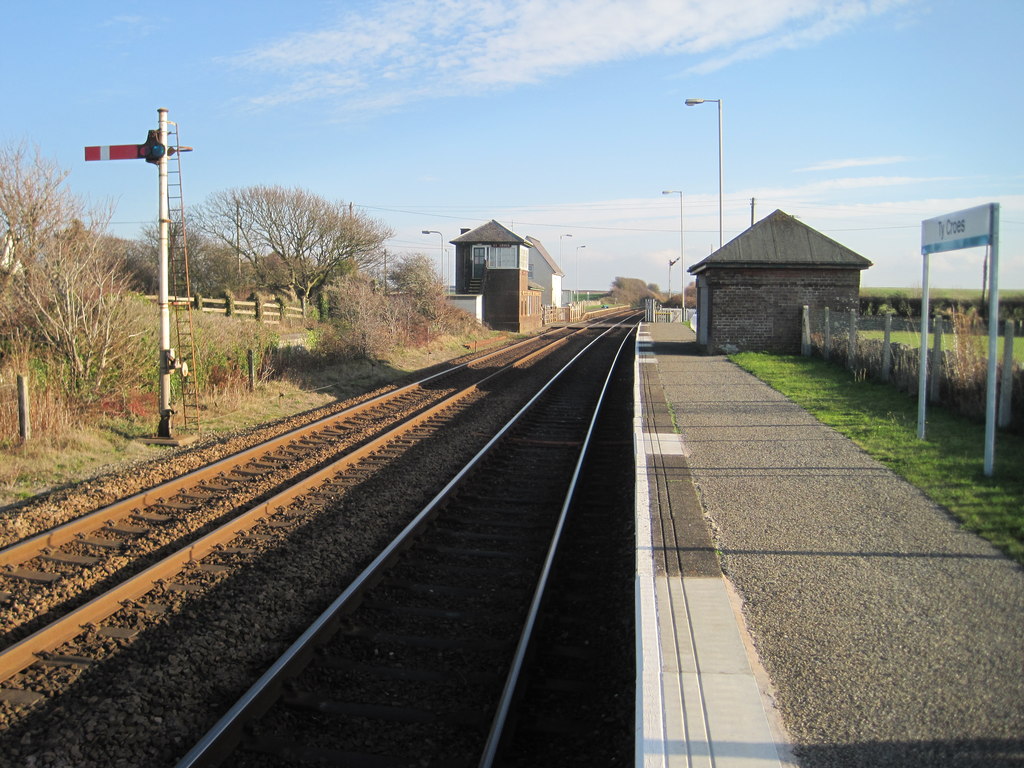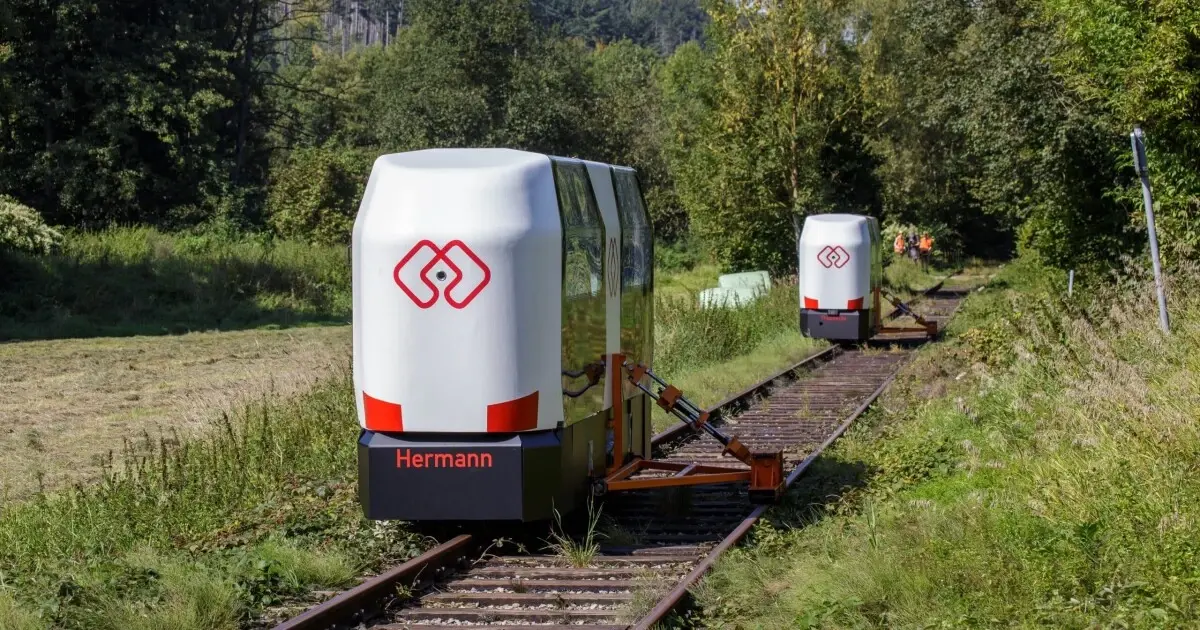- cross-posted to:
- micromobility@lemmy.world
- technology@slrpnk.net
- cross-posted to:
- micromobility@lemmy.world
- technology@slrpnk.net
Great, now we can have traffic but on these old rails.
How about, and I know this is a radical idea, actually fixing up the old rail lines and putting trains on them instead of this gimmick?
This wouldnwork better on smaller scale, less traveled rural routes. Maintaining a whole ass train for a few dozen people is overkill. I kinda like this.
Depends on what you call a “whole ass train”. Many of these routes could be easily service by a 1 or 2 car DMU like the rural routes in Scotland and Wales.
There are stations on Anglesey where you have to stick your arm out to hail the train, and the only two routes they lie on are served by the kind of 1970s DMU like you mentioned on its way to Chester or a Pendelino on its way to London or something.
I’ve used those request stops! Those sort of rural lines are exactly what we’re missing here in the states, just bouncing back and forth on the line. You can see here Americans don’t even know what they are, but they’re the perfect solution for these lines going between little towns
I live next to a railway line in the south west that is similar. A single train runs up and down the line. If you’re on one of the stations, you wave to the train so it’ll stop for you. If you’re on the train and want to get off, you ask the driver to stop.
That sounds more like a tram than a train
They’re definitely trains. I live next to a similar one. It is physically a train, with exactly the same hardware as trains on busier lines (though typically only hauling 1-2 carriages instead of 4+). It’s just more fuel-efficient for a train to keep going through a station if nobody is getting on or off, so when passenger numbers are low, the practice is to let the driver know if you need on or off.
This is what one of the stations looks like:

Seems like a train that uses both sides of the track fulfills different requirements. A train can only be made to go one way at a time, but can hold more people (increased bandwidth), but these smaller half-cars can be moving people in both directions at the same time (lower latency). Seems quite clever if it works out.
Would it though? It’s just vans on tracks instead of roads.
It’s not going to be more energy efficient with individually powered cabs. It’s not going to be more convenient unless your origin and destination are near a station. It’s not going to be more time efficient because of the extra distance getting to and from tracks and because you aren’t going to drive highway speeds in tiny self-balancing cars on old rails, especially when passing cars going the opposite direction. It’s not going to be more cost efficient because it’s more total moving parts requiring maintenance per person per trip.
It sounds like they are solving the problem of turning around only for terminal stations. This might make sense for trains that carry many people, but if you’re making cars on tracks there is no good solution. If you need to spend money on a system that turns the cabs around, then you either spend more money installing those systems at most stations or you spend money maintaining cabs that are driving around empty. Either way, cars on roads are cheaper.
They say it’s good for people who don’t want to wait for public transit, but they don’t say how this solves that problem. With public transit, you know when the train will be there. With this, unless they have a way for the cabs to wait at the station without blocking other cabs going the same direction, you have to wait for a cab to come and you can’t time your trip to the station around when the cab will be there. Maybe they have one? It would be a disaster if you wanted to get on from near the middle and needed to wait for either a cab that has already been vacated to come or for a cab to come all the way from the start of the track.
OK, it’s 2pm. With this system, you call a pod and ride it. With a rural train, you check the schedule and see that the next train is at 5pm. And you have to plan your trip back as well. Great, time to take your car.
And you might say “let’s have trains run at least once per hour then”. That means running empty trains all day, not sure it’s the best way to spend public money.
If your options are waiting at the station up to 2 hours for a pod or waiting anywhere else 3 hours for a train, are the pods better?
Obviously if the pods take 2h to arrive it’s not worth it
I know it’s kinda cheating to bring them up in this context, but the Swiss manage to run trains to very small towns just fine
deleted by creator
Old railway lines in Europe often aren’t complete anymore and only cover relatively small distances.
There simply isn’t enough infrastructure to handle a full train network and fixing them up would probably require existing infrastructure and buildings to be disowned and destroyed.
Yes Louis Brennan designed a gyroscopic monorail in the early 1900’s but there’s a reason it didn’t work out. Every car needs its own gyroscope which is a lot of dynamic components that need maintenance. A regular two rail train is much simpler and cheaper to operate. The idea these techbros have that everything is made better with individual pods is pretty wasteful when we already have better and cheaper solutions to virtually every problem they have tried to invent for us. Are we even super concerned about rural folks taking transit? By definition they are a small portion of the population and have the greatest need for personal transport. Where we need transit adoption is in urban areas with large populations who all want to drive their personal 2 tonnes of plastic and steel right into town and park it (for free obviously) in their own little parking space.
A gadgetbahn like this will only serve a limited population and won’t be able to tie into the existing transit network. There might be niche situations where it’s not a terrible idea but it is not a good generalized solution.
I could see those as an option for rural areas without much traffic. A full train might not be economical, but a small pod is. It could transport people to the closest proper train station where they can hop off.
But that would mean you’d have to maintain a ton of tracks for a handful of people.
Just fund trains.
Trains suck if you don’t have frequency, and because of the population density with a good frequency more than half of the trains will be completely empty and the rest almost empty.
If you out half the funding from car infrastructure instead into train and bus infrastructure this would not be a problem. Induced demand works both ways.
The population in rural areas is so low that no matter how you induce demand, it won’t work.
Look up “interurban railways”. Most towns east of the Mississippi used to have frequent rail service with whistle stops at every farm and crossroads. In addition to passengers these railroads also transported the harvest, Sears purchases, kit houses, even hearses!
This almost certainly wouldn’t work in the United States but it does in Europe because Europe has loads of these tiny abandoned rail lines (often single track) that were built in the 1800s and then abandoned. They don’t go anywhere particularly densely populated, you know because of the industrial Revolution causing everyone to move to the cities, so there isn’t the demand for a full rail service. Meaning they’re not going to spend the money upgrading the infrastructure to modern standards.
This means they can be used at relatively cheap cost. As long as the tracks are still physically present all they need to do is cut some weeds down and put these things on the line and they’re good to go. It’s a cheap project that a local municipal authority can handle without having to involve wider government.
Even with unlimited funding, you want to scale the size of the train to the population that could potentially ride on it.
A P42 locomotive pulling 7 Amtrak superliner cars is 700 tons of steel getting 0.4 miles per gallon of diesel. That’s a crapton of mining and drilling and CO2, and it would be incredibly wasteful if it ended up carrying, like, two people at a time.
Cars suck always.

Looking forward to the Adam Something video about this.
I immediately thought about connecting multiple of these together to make a train haha
Connect them together for efficiency, and maybe use both rails for stability and to reduce design conplexity. (you dont even need any additional infrastructure!) Also, have them arrive regularly, so that users don’t need to bother with an app! Brilliant!
Seriously though, it’s really amazing how people keep inventing trains but worse. I guess this idea makes some sense if there aren’t enough riders for regular train service, but still…
Ahah, I just told myself: cannot wait for Adam Something to debunk this
JUST PUT A FUCKING TRAIN ON IT WTF ARE WE DOING
Read the article, that’s literally the first thing they explain
Besides which, it’s very obviously a train if you just look at it. It’s a small monorail train specifically designed for this purpose using existing infrastructure.
People are never fucking happy.
A train is a collection of rolling railcars propelled by one or more locomotives. These are individual self-powered railcars.
So no, there’s no train here. Just monorail pods that will get congested as density increases.
The whole concept of a train is that all the cars move together and the only congestion is at the switching yards, where it can be optimized.
These pods are only used on rails with very low ridership. They would switch to a train if ridership increased.
Look at it this way: you can have a train that has a capacity of 100 people, but it only runs once a day due to the low demand, and only 2 people want to ride it at that time of day…Or you can have 10 pods, which do not require as much railway maintenance, and they can carry the 10 people who actually want to use this railway, completely on demand.
Yeah, a train is better if you want to move ten thousand people a day at peak hour. But this is a cheaper way to move ten people at different times across a day. And it’s a cheaper way of inducing the demand that would justify the more efficient kind of expansion.
Isn’t it better to have a train that runs when you want rather than having to wait potentially hours for the scheduled commuter train. Isn’t this better?
FUCKING DOING OUR JOB AS TRANSPORT MODELLERS AND DOING A FUCKING COST BENEFIT ANALYSIS THAT SHOWS YOU’RE NEVER GOING TO GET FUCKING MODE SHIFT FROM RURAL USERS UNLESS YOU RUN A FUCKING METRO STYLE 10 MINUTELY SERVICE WHICH IS FUCKING UNFEASIBLE WITH THE FUCKING RESOURCES WE HAVE AVAILABLE.
IN THE FUCKING UK WE HAVE A LARGE NUMBER OF FUCKING ABANDONED RAILWAYS FROM THE PERIOD OF FUCKING COAL MINING THAT WOULDN’T HAVE ANYWHERE NEAR THE FUCKING DEMAND NECESSARY TO JUSTIFY SETTING UP AN EXPENSIVE AS FUCK SIGNALLING SYSTEM TO BRING THEM UP TO MODERN FUCKING SAFETY STANDARDS, ALONGSIDE REPLACING THE FUCKING RAILS, SLEEPERS AND BEDS.
IF INSTEAD YOU CAN HAVE A FUCKING PUBLICALLY OWNED FLEET OF FUCKING ELECTRIC ‘MINI TRAINS’ THAT PEOPLE COULD USE FOR INFREQUENT BUT NECESSARY TRIPS, THAT COULD REMOVE A FUCKING SIGNIFICANT BARRIER TO MODE SHIFT, WHICH WOULD BE PRETTY FUCKING RAD
Trains are expensive to run if you don’t have enough passengers (like in small villages).
Mobile fuck shack.
Why is it always fucking pods!? (Fucking-pods?)
I would love a mini rail system like this in my community.
Actually, I’ll take most any public transportation at this point.
Seems over-complicated…
I could imagine an autonomous, on-demand rural train service. Due to the low expected traffic, it seems like you could just build some additional sidings and use a more conventional design.
How would traffic pass each other? You would be stuck with the same issue as normal trains.
You could build some additional sidings
If someone was willing to invest into building and maintaining infrastructure there would be no need for this concept, but that’s a political issue. The idea of this concept is do make the best of what you have.
The Brennan monorail rides again!
Some of this technology may sound a bit “over-ambitious,” but keep in mind the project was inspired by a fully functional self-balancing monorail that mechanical engineer Louis Brennan designed and demonstrated back in the early 1900s.
Self balancing with an Outrigger wheel
Fucking cowards
The wheel is just there during the testing phase as a backup, seems the final pods don’t have it, as it would make the idea useless.
That was my thought. and those pedal bikes with outrigger to run abandoned rail lines is already a thing
I’m cautiously optimistic about this, it seems like an okay idea and the fact that they have vehicles working on a test track IRL means it’s at least not an obvious scam like hyperloop.
Also the fact that they have a specific use case in mind, don’t say it’s going to revolutionize all transportation, and are reusing existing infrastructure, all bode well.
The crane is the part I don’t get. Is it a stationary crane? Is that not more work than just putting a track switch in place instead?
It’s only for the alpha-test vehicles. The crane does not touch the rails, it’s a security issue for testing e.g. min power gyro
The problem is that the wheels have flanges on both sides, so I don’t think switches work.
The best solution would be a loop connecting the rails at each end, but that’s obviously not compatible with running regular freight trains since it would need to be switchless.
Thus presumably they need to be externally flipped around and moved, for which I’d guess a crane like those used for moving containers on and off trains is ideal.
With a crane they could also easily move the vehicles to a storage area so freight trains can pass through.
However, what if it were possible to hail a small electric vehicle right when you needed it – via a taxi- or Uber-style app
Uber style app. Seriously, fuck no. Send trains or don’t, fuck Uber and their business model.
Why is it always “pods”?
How else are they going to win the rail pod challenge?
Project founder Thorsten Försterling tells us that the team is working on a track-installed machine that will be able to lift individual pods off of one rail and place them on the other (without passengers in them at the time), keeping them from all collecting at either end of the route.
What the heck, can’t you just have a Y at the end?
on-demand pods that travel on existing abandoned railways.
They’re reusing existing tracks.
Hmm, so your thinking is they’re not allowed to modify the existing tracks at all?
It just seems like building and maintaining a machine that lifts these pods, that’s gotta be a magnitude more expensive than a slight change to the rails…
I don’t see why it’d be that expensive, it’d basically just be a fancy crane.
I’m not saying that it’s hugely expensive. I’m just saying that a Y-shaped rail with a switch should be significantly cheaper.
Particularly, moving parts are a pain for maintenance. These kind of systems, you want to operate for 20+ years and the less bearings there are to oil, the better.
They’re probably marketing this as requiring zero infrastructure changes to attract buyers and investors. Just put the pod lifter at the end of the track and it’s done.
Yeah, that’s quite possible, that they offer it for marketing. Maybe also to give municipalities an option to try out the system for a few months and see, if it attracts much interest. If it doesn’t, you can just pack up the pods and cranes, and market it to the next city.
I was mainly confused how off-handedly this gets mentioned in the article, as if that was clearly the logical method for moving a vehicle from one place to another…
Look at the wheels, flanges on both sides.
I don’t think that’s compatible with switches.
I’m definitely willing to believe that they’ve got monorail-like flanges. That would probably help with stabilizing. But where the hell are you able to see a picture of the wheels? There’s a few angles in the video which quickly show the wheels, but I can’t actually see much anyways. 🫠
it’s very visible in the first shot of this video where they do some test runs: https://www.youtube.com/watch?v=d2al1oFolWM

















